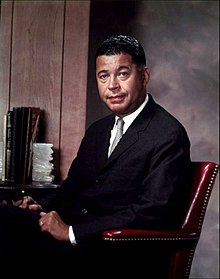Edward Brooke | |
|---|---|
 Official portrait, c. 1967 | |
| United States Senator from Massachusetts | |
| In office January 3, 1967 – January 3, 1979 | |
| Preceded by | Leverett Saltonstall |
| Succeeded by | Paul Tsongas |
| 35th Attorney General of Massachusetts | |
| In office January 3, 1963 – January 3, 1967 | |
| Governor | |
| Preceded by | Edward McCormack |
| Succeeded by | Edward T. Martin |
| Personal details | |
| Born | Edward William Brooke III October 26, 1919 Washington, D.C., U.S. |
| Died | January 3, 2015 (aged 95) Coral Gables, Florida, U.S. |
| Resting place | Arlington National Cemetery |
| Political party | Republican |
| Spouses |
|
| Children | 3 |
| Education | |
| Awards |
|
| Military service | |
| Branch/service | United States Army |
| Years of service | 1941–1946 |
| Rank | |
| Unit | 366th Infantry Regiment |
| Battles/wars |
|
Edward William Brooke III (October 26, 1919 – January 3, 2015) was an American lawyer and politician who represented Massachusetts in the United States Senate from 1967 to 1979. A member of the Republican Party, he was the first African American elected to the United States Senate by popular vote.[1][a] Prior to serving in the Senate, he served as the Attorney General of the Commonwealth of Massachusetts from 1963 until 1967. Edward Brooke was the first African-American since Reconstruction in 1874 to have been elected to the United States Senate and he was the first African-American since 1881 to have held a United States Senate seat. Brooke was also the first African-American U.S. senator to ever be re-elected.
Born to a middle-class black family, Brooke was raised in Washington, D.C. After attending Howard University, he graduated from Boston University School of Law in 1948 after serving in the U.S. Army during World War II. Beginning in 1950, he became involved in politics, when he ran for a seat in the Massachusetts House of Representatives. After serving as chairman of the Boston Finance Commission, Brooke was elected attorney general in 1962, becoming the first African-American to be elected attorney general of any state.
He served as attorney general for four years, before running for Senate in 1966. In the election, he defeated Democratic former Governor Endicott Peabody in a landslide, and was seated on January 3, 1967. In the Senate, Brooke aligned with the liberal faction in the Republican party. He co-wrote the Civil Rights Act of 1968, which prohibited housing discrimination. He was re-elected to a second term in 1972, after defeating attorney John Droney. Brooke became a prominent critic of Republican President Richard Nixon, and was the first Senate Republican to call for Nixon's resignation in light of the Watergate scandal. In 1978, he ran for a third term, but was defeated by Democrat Paul Tsongas. After leaving the Senate, Brooke practiced law in Washington, D.C., and was affiliated with various businesses and nonprofit organizations. Brooke died in 2015, at his home in Coral Gables, Florida, at the age of 95, and was the last living former U.S. senator born in the 1910s.
- ^ "U.S. Senate: Edward Brooke: A Featured Biography". senate.gov. Retrieved January 23, 2022.
- ^ Cite error: The named reference
NYTwas invoked but never defined (see the help page).
Cite error: There are <ref group=lower-alpha> tags or {{efn}} templates on this page, but the references will not show without a {{reflist|group=lower-alpha}} template or {{notelist}} template (see the help page).